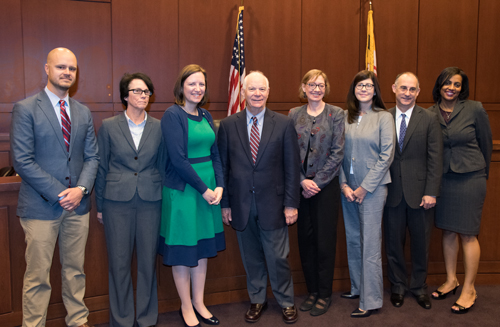Maryland Carey Law Hosts Public Tax Forum
The University of Maryland Francis King Carey School of Law hosted a public forum convened by National Taxpayer Advocate Nina E. Olson, JD, and Maryland Sen. Benjamin L. Cardin, JD ’67.
The forum, held May 13 in the school’s Moot Courtroom, featured an invited panel of representatives from the small business and Baltimore-area taxpayer communities. Each was asked by the advocate to discuss what taxpayers want and need from the Internal Revenue Service (IRS) to comply with tax obligations.
Maryland Carey Law Dean Donald B. Tobin, JD, a professor specializing in tax law, noted that Olson is unique. As an independent ombudswoman, she is the only IRS employee who is allowed to propose legislation to Congress.
“Most people don’t understand the important role that the taxpayer advocate plays in ensuring a just and equitable tax system,” said Tobin. “She’s charged with monitoring the tax system and suggesting improvements for all of us. In a sense, she works for us.”

Adam Crandell, JD ’10, left, Elizabeth Atkinson, JD; Robin McKinney, MSW '01; Sen. Benjamin L. Cardin, JD ’67; National Taxpayer Advocate Nina E. Olson, JD; Angela Armstrong; Dean Donald B. Tobin, JD; and Beverly L. Winstead, JD ’08.
Panelists included the director of Maryland Carey Law’s Low Income Taxpayer Clinic (LITC) and an alumnus who is an immigration attorney. Members of the school’s faculty and others from the University of Maryland, Baltimore (UMB) were among those attending the forum, the sixth in a series being held in local communities across the nation.
Tobin pointed out that in the advocate's 2015 annual report to Congress, Olson had proposed the series of forums to gather input before the IRS adopts a five-year plan. The “Future State Plan" would create an online taxpayer account and consultations that would substantially reduce the number of telephone calls and visits the IRS receives from taxpayers.
Cardin offered background for the forum by referring to repeated cuts in the IRS budget by a politically divided Congress. “It reflects an attitude by many of my colleagues who don’t want the IRS to be nearly as aggressive as some of us would like to see,” he said.
Speaking as a member of the Finance Committee and its subcommittee on taxation and IRS oversight, Cardin thanked the employees of the IRS who are asked to do more with less. He also described aspects of a taxpayer rights bill (S. 2333/H.R. 4128) that he co-authored and that he hopes will attract bipartisan support.
Olson said the agency’s “Future State Plan” is being driven by the budget situation that Cardin had outlined. The forums are intended to help make the case to Congress regarding “what people need from the IRS in order to comply with this very complex tax code.”
Maryland Carey LITC Director Beverly L. Winstead, JD ’08, said the LITC serves low-income taxpayers from across the state, many of whom do not understand notices they have received from the IRS. “All in all, better communication would allow more taxpayers to resolve their issues on their own without the need to call the IRS,” she said.
Adam Crandell, JD ’10, a Baltimore-based immigration attorney, said tax returns and tax compliance are crucial components of many cases. But records may be inadequate when his clients rely on third-party preparers who often misfile, give bad advice, or are malfeasant. He urged that the IRS proceed with caution to avoid widening a knowledge gap. “I’m concerned about the people who fill that gap,” he said.
Maryland CASH Campaign Director Robin McKinney, MSW '01, a University of Maryland School of Social Work clinical instructor, spoke on behalf of working families served by the nonprofit organization that she co-founded. “The current IRS Future State Plan may work for some taxpayers, but it will leave the needs of a significant number of low-income taxpayers unmet,” she said, stating that online services are not a viable method. “As a social worker I see that many need that navigation help.”
In addition to the three panelists with ties to UMB, the forum also heard from Elizabeth Atkinson, JD, an attorney with LeClairRyan PC, of Annapolis, Md.; Angela Armstrong, a registered veterinary technician whose business, Animal Emergency Hospital in Bel Air, Md., became the victim of payroll provider fraud; and from members of the public.



